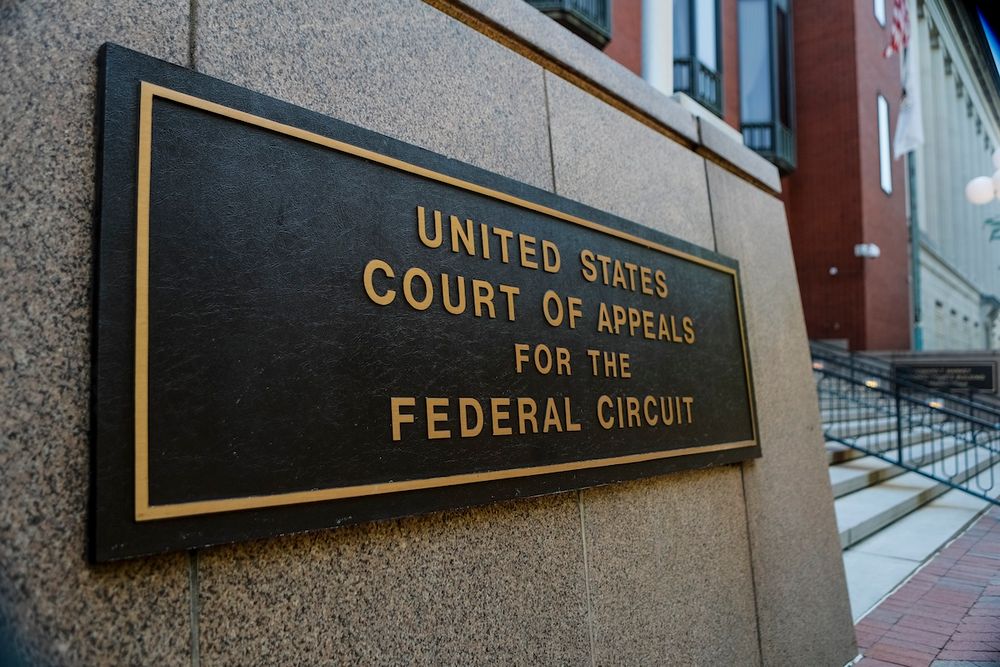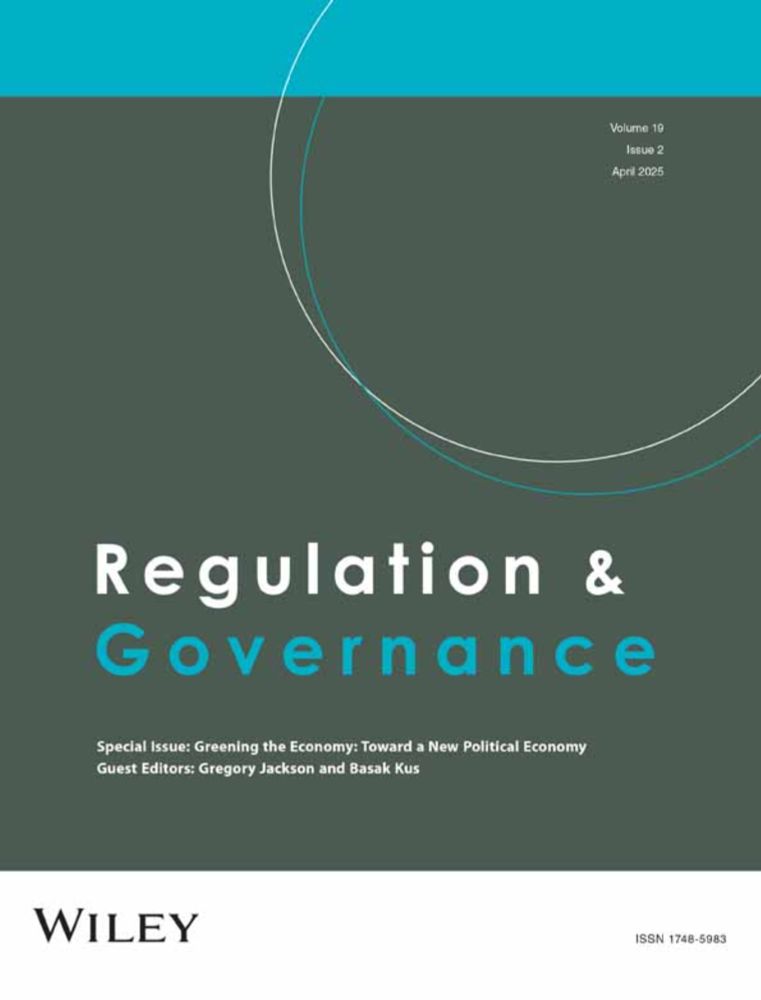🚨New piece in Politics & Society! w/ @maxkiefel.bsky.social @mathiaslarsen.bsky.social
Internationalizing Industrial Policy: How China and the United States Use State Capacity to Secure Critical Minerals for Electric Vehicles 🇨🇳 🇺🇸
doi.org/10.1177/0032...
05.02.2026 13:26 — 👍 39 🔁 21 💬 5 📌 0

Could America win the AI race but lose the war?
The US has gone all-in on artificial intelligence. But the idea of an end-of-times battle with China over tomorrow’s key technology is part delusion, part lobbying tool for Silicon Valley
US bet: Ai, China bet: Green
“In 2024, the country invested an estimated $940bn in clean-energy capex, broadly defined as renewables, electricity grids and energy storage (batteries), dwarfing its AI investments” ft.com/content/1258...
Presented basically this argmnt last wk @basakkus.bsky.social
14.12.2025 04:01 — 👍 46 🔁 20 💬 2 📌 1
It’s been 20 years and, as always happens, people have forgotten again that financial markets are inherently prone to collapse. It looks superficially different every time so we can con ourselves into believing otherwise
18.10.2025 22:30 — 👍 33 🔁 9 💬 3 📌 1
Client Challenge
I finally got around to reading @jonasmeckling.bsky.social's Nature article "The geoeconomic turn in decarbonization" and it is a must read!
www.nature.com/articles/s41...
14.10.2025 13:31 — 👍 6 🔁 1 💬 1 📌 1

“Chinese overseas FDI is nearing $100 billion per year. The Marshall Plan was $200b—and locked Europe into US tech and standards. When we see sums of this size, we can ask whether it will have a similar effect on the globe.”
NEW: @70sbachchan.bsky.social & @mathiaslarsen.bsky.social on the BRI 2.0
20.09.2025 17:48 — 👍 20 🔁 9 💬 1 📌 2
This year, the College of the Environment think tank at Wes will focus on “Risk and Uncertain Futures: Responding to Global Disruptions.” We've exciting events in the works and are thrilled to welcome Tim Sahay as our distinguished fellow!
@70sbachchan.bsky.social @wesleyanuniversity.bsky.social
22.08.2025 18:40 — 👍 3 🔁 0 💬 0 📌 0
We're now inviting proposals for the New Thinking in Industrial Policy Conference, November 6–7, 2025, at Columbia University!
It is a great opportunity to present and discuss the latest research on industrial policy across the social sciences.
07.08.2025 19:01 — 👍 4 🔁 3 💬 0 📌 0
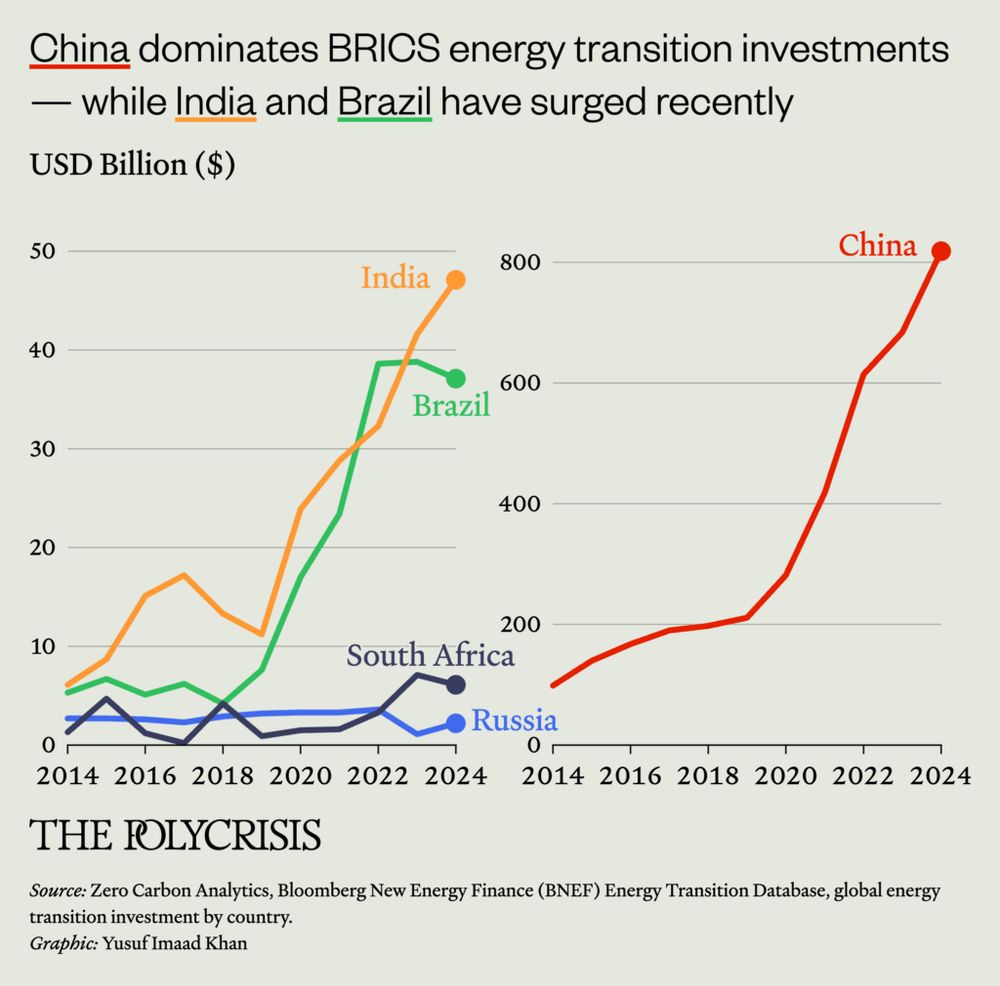
“The postwar order rested on three pillars: American hegemony, the fossil-fuel energy system, and an open, multilateral trading order. America has now attacked each pillar at the foundation of its hydrocarbon global order.” —
New: @katemac.bsky.social & I
www.phenomenalworld.org/analysis/bri...
05.07.2025 21:18 — 👍 634 🔁 185 💬 15 📌 31
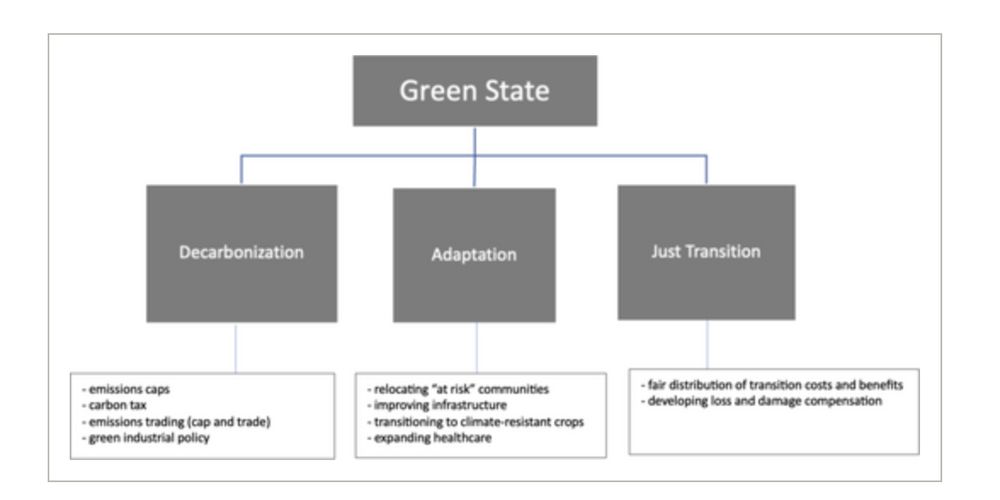
Just as welfare states can be categorized by their various functions—how much they decommodify, how much they equalize, the source of provision, and whom they primarily benefit—green states can also be conceptualized and categorized by the roles they play and how those roles are structured.
08.04.2025 15:06 — 👍 1 🔁 0 💬 0 📌 0
How to think about the green state? "Just as the welfare state was a political response to protect the social body from the risks and fluctuations of market-based economic systems, green states are a political response to shield against the many changes and disruptions caused by climate change...
08.04.2025 15:04 — 👍 1 🔁 0 💬 1 📌 0
We argue that "fully addressing the transformative challenges brought up by climate change requires a fundamental rethinking of core PE concepts related to the state, distributional struggles, economic growth, varieties of capitalism, and markets."
08.04.2025 15:01 — 👍 0 🔁 0 💬 1 📌 0
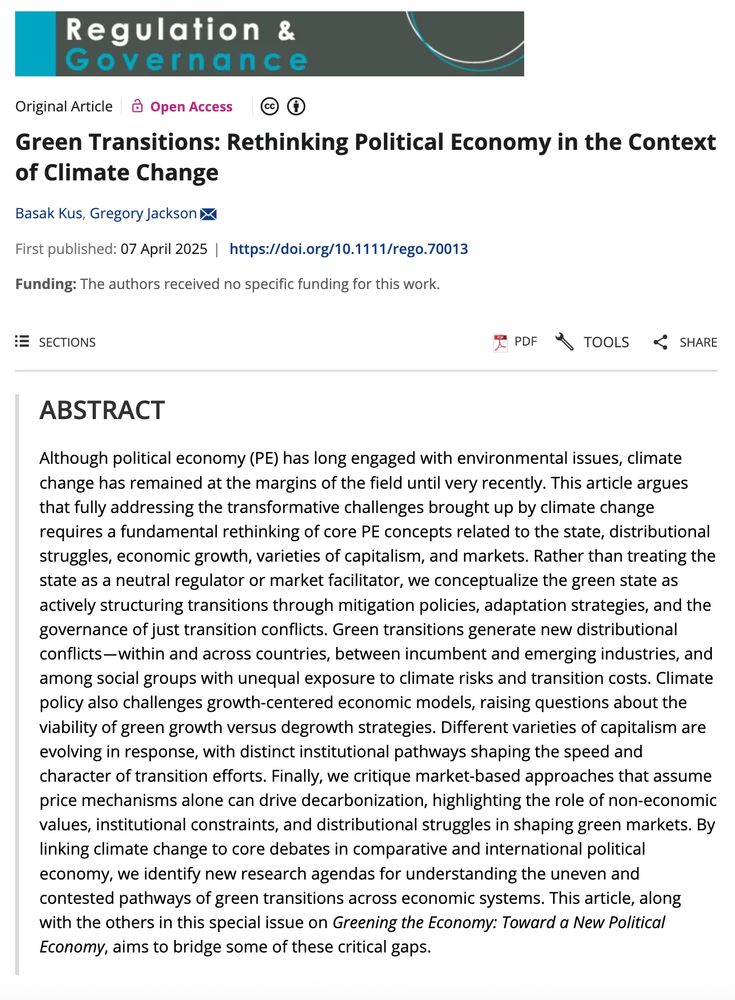
ABSTRACT
Although political economy (PE) has long engaged with environmental issues, climate change has remained at the margins of the field until very recently. This article argues that fully addressing the transformative challenges brought up by climate change requires a fundamental rethinking of core PE concepts related to the state, distributional struggles, economic growth, varieties of capitalism, and markets. Rather than treating the state as a neutral regulator or market facilitator, we conceptualize the green state as actively structuring transitions through mitigation policies, adaptation strategies, and the governance of just transition conflicts. Green transitions generate new distributional conflicts—within and across countries, between incumbent and emerging industries, and among social groups with unequal exposure to climate risks and transition costs. Climate policy also challenges growth-centered economic models, raising questions about the viability of green growth versus degrowth strategies. Different varieties of capitalism are evolving in response, with distinct institutional pathways shaping the speed and character of transition efforts. Finally, we critique market-based approaches that assume price mechanisms alone can drive decarbonization, highlighting the role of non-economic values, institutional constraints, and distributional struggles in shaping green markets. By linking climate change to core debates in comparative and international political economy, we identify new research agendas for understanding the uneven and contested pathways of green transitions across economic systems. This article, along with the others in this special issue on Greening the Economy: Toward a New Political Economy, aims to bridge some of these critical gaps.
#Specialissue #Greentransitions #Politicaleconomy
'Green Transitions: Rethinking Political Economy in the Context of Climate Change'
by @basakkus.bsky.social & Gregory Jackson
See special issue introduction 👇
onlinelibrary.wiley.com/doi/full/10....
08.04.2025 12:56 — 👍 7 🔁 3 💬 1 📌 1
Picking Losers: Climate Change and Managed Decline in the European Union
You have to enable JavaScript in your browser's settings in order to use the eReader.
Ah! I forgot about THIS amazing paper by @trgn.bsky.social and Luuk Schmitz. You want to know what the divestments and losses involved with decarbonization mean for the regulatory state? Make sure to read it!
@reggovjournal.bsky.social
onlinelibrary.wiley.com/doi/epdf/10....
06.03.2025 17:09 — 👍 6 🔁 0 💬 0 📌 1
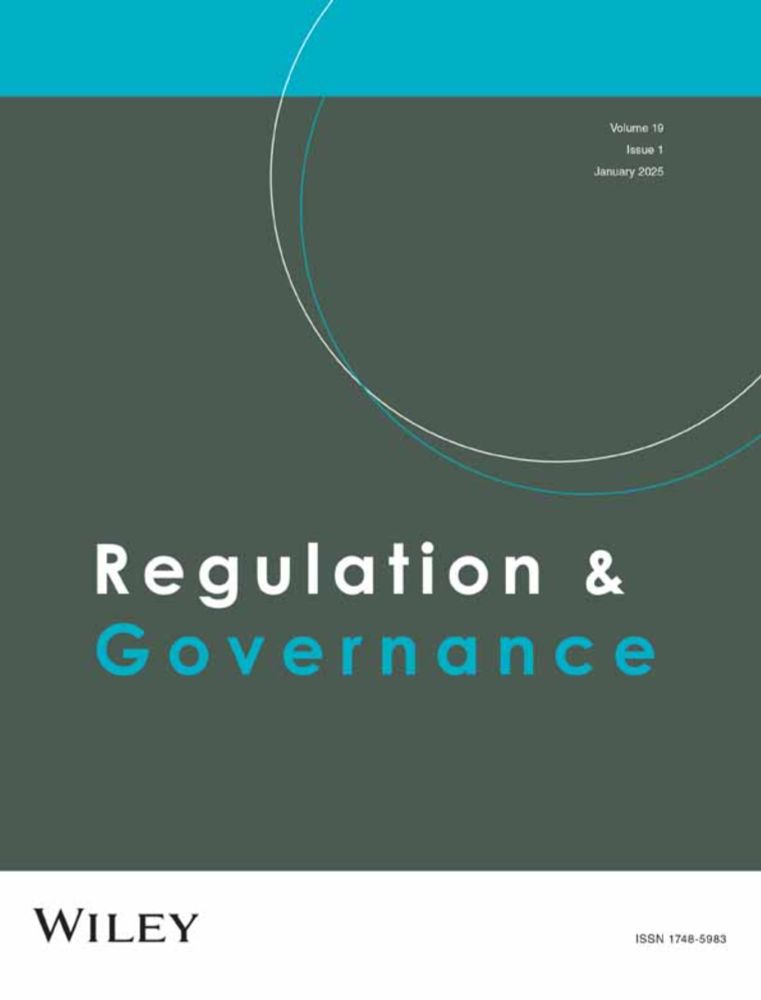
Climate Change and the Social Order
Despite decades of awareness, societies have failed to adequately respond to climate change, as evidenced by rising CO2 emissions and the continued dominance of fossil fuels in global energy consumpt...
And Jens Beckert frames the climate crisis as a crisis of legitimation. He argues that the climate crisis and the politics of adaptation will be the defining issues in the coming decades, and social scientists must engage with these issues.
onlinelibrary.wiley.com/doi/10.1111/...
28.02.2025 20:57 — 👍 2 🔁 0 💬 0 📌 0
As part of our special issue on the political economy of climate change, Gregory Jackson and I invited essays from three senior scholars to discuss the issue from perspectives they believe need to be addressed: Jens Beckert, Kathryn Hochstetler, and Neil Fligstein.
28.02.2025 20:55 — 👍 6 🔁 2 💬 1 📌 0
@reggovjournal.bsky.social has arrived on Bsky. Hello hello!
14.02.2025 03:09 — 👍 5 🔁 0 💬 0 📌 0
Another paper out from our special issue on Greening the Economy. @joseatiles.bsky.social and David Whyte examine the role of "regulatory havens" in climate change by looking at fossil capital in the Caribbean. Read here: onlinelibrary.wiley.com/doi/full/10....
13.02.2025 19:40 — 👍 12 🔁 3 💬 0 📌 0
@fredericmerand.bsky.social and I tried to reach all of Neil's PhD students through the lists that were provided to us, but we worry that we may still have missed some. If this applies to you, our apologies! If you're interested in attending, please let us know!
Feel free to share!
22.01.2025 00:02 — 👍 1 🔁 1 💬 0 📌 0
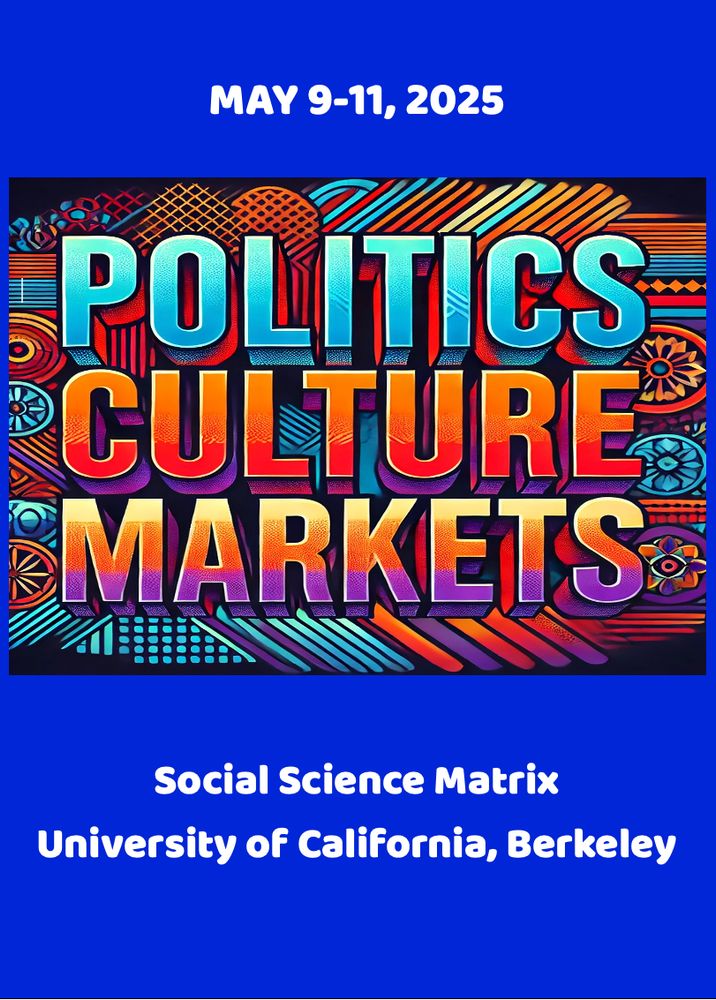
In May, we will convene in Berkeley for a 2-day conference to honor Neil Fligstein, our retiring mentor, and discuss recent developments in economic sociology and political economy. Many thanks to Berkeley Economy and Society Initiative and the Dept of Sociology.
sites.google.com/berkeley.edu...
22.01.2025 00:00 — 👍 6 🔁 0 💬 1 📌 0
Here it is: scholar.harvard.edu/files/boniko...
17.01.2025 02:32 — 👍 1 🔁 0 💬 1 📌 0
It seems to me that the scholarship on the topic is still heavily focused on electoral politics and we don't know that much about how populism has penetrated into other political institutional spaces.
16.01.2025 16:29 — 👍 2 🔁 0 💬 0 📌 0
Empowering individuals and communities through grassroots initiatives & education to act now for basic income. Let's show them our numbers!
Join basicincomeaction.org
DMs Open ❤️ Re-Shares
Climate and Community Institute is a progressive climate and economy think tank. We work with movements and progressive policy makers to pass new policy, improve implementation, shift narratives, and deepen coalitions. 🌱 http://www.climateandcommunity.org
Author of "The Secret History of the Rape Kit" and 11 other books. Contributor to NY Times, Atlantic, New Yorker, etc. Former "zine queen" of the 1990s.
CT chapter of @scholars.org, connecting researchers to policymakers, civic leaders & journalists to improve policy and strengthen democracy.
#ScholarReflections op-eds @ctmirror.org
scholars.org/membership
Academic in Security Studies | PhD in National and International Security Strategies (Turkish War Colleges) | MA in European Studies (UBC) | BA in Public Administration (Istanbul University, Turkey) | Diyarbakır native & Galatasaray Fan.
President, @EPI-org. Board member, EPI Action. Former Chief Economist, US Dept of Labor. Bike commuter, backyard beekeeper. Tweets my own. She/her.
An independent publisher. Changing minds about justice since 1992.
lnk.bio/thenewpress
Low vision, long covid, bad faith, good times
https://www.andrewleland.org
Independent global health news written by experienced journalists. Non-profit media company with HQ in Geneva, Switzerland.
Sign-up for daily email news alerts: http://healthpolicy-watch.news
art & architectural historian / visual, material & religious culture
Sociologist of law and conflict. I write about torture, war crimes, military courts and occupations. Ask me about Guantánamo.
Author of Democracy of Sound (Oxford, 2013) and Brain Magnet (Columbia, 2020), co-ed of #EastofEast (Rutgers, 2022); editor at Tropics of Meta; a little bit omnipotent 🏳️🌈🏳️⚧️🇱🇾🇵🇸 she/her
Sentientism, food policy for desired/anticipated consumption patterns, plant-based food for climate, consumption behaviour, history and reporting of global goals, framing.
Historian of the intelligentsia. Odi profanum vulgus et arceo. Deputy Editor @NoemaMag.com. Check out "Children of a Modest Star": https://www.sup.org/books/politics/children-modest-star. Posts my own
Longform journalism exploring fresh ideas. Pitch us: edit@noemamag.com
Historian, writer. Professor of History, Swarthmore College. Most recent: MURDER IN A MILL TOWN (Oxford UP). Rep'd by Mullane Literary Associates.
Investigating the US and UK military industrial complexes as economic, climate and geopolitical threats. By @cmmonwealth.bsky.social and @cplusc.bsky.social.
Interim ED @cplusc.bsky.social // co-director @transitionsec.bsky.social Political economy in the climate+ecological crisis. Terrible taste in music. climateandcommunity.org // transitionsecurity.org // https://bit.ly/pb_pubs
Professor of Sociology, Psychology, & Org Behavior, Stanford University
Director, Polarization and Social Change Lab, @pascl-stanford.bsky.social
Co-Director, Stanford Center on Philanthropy and Civil Society



